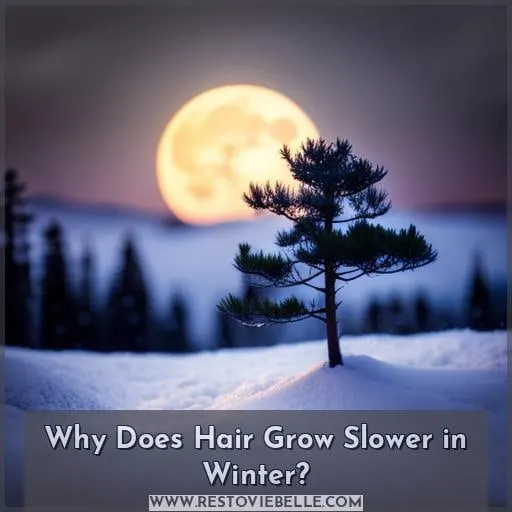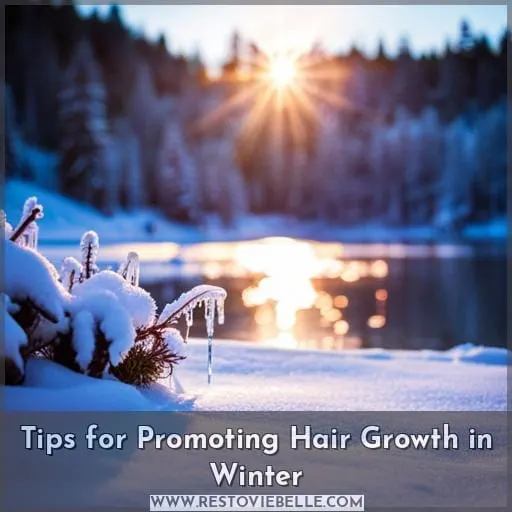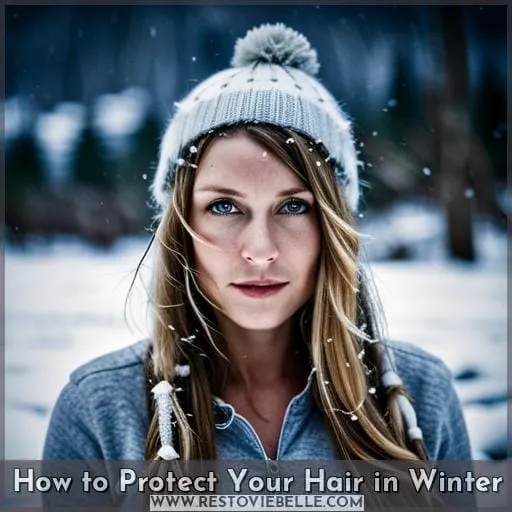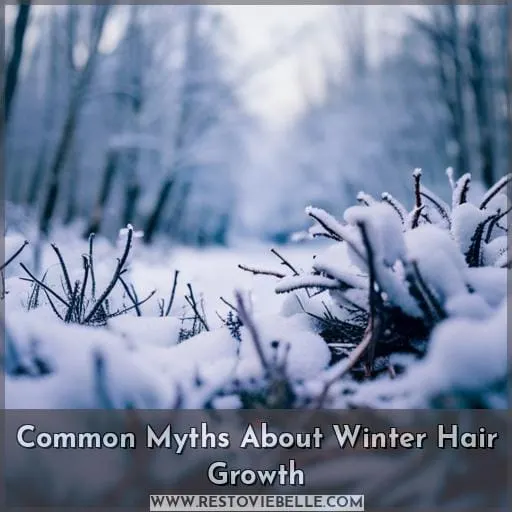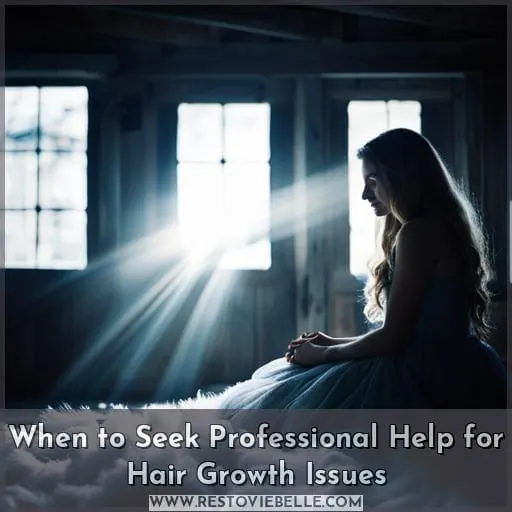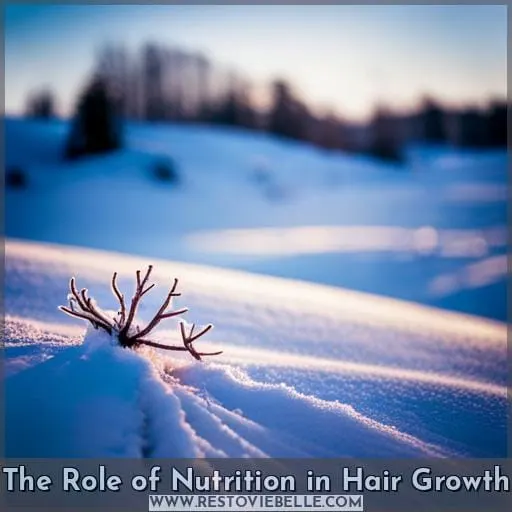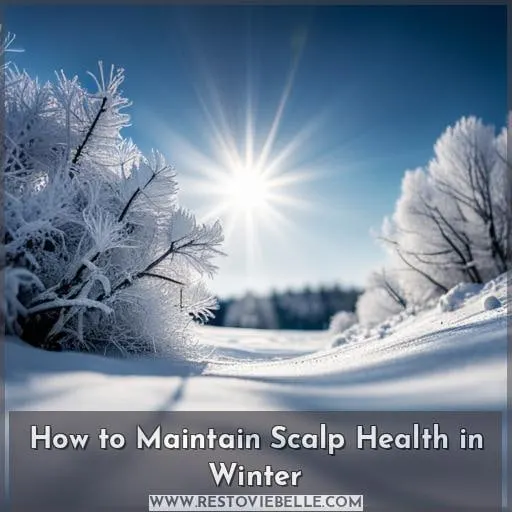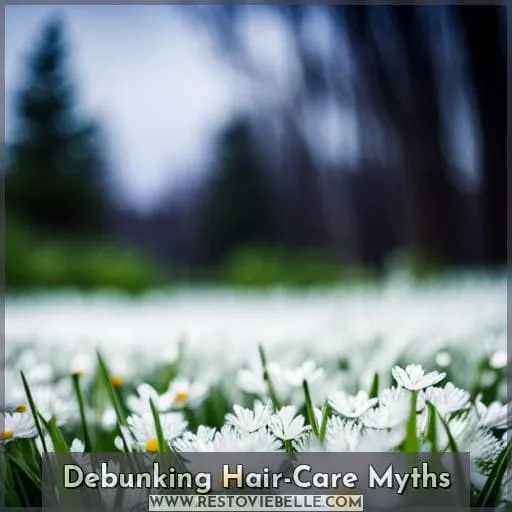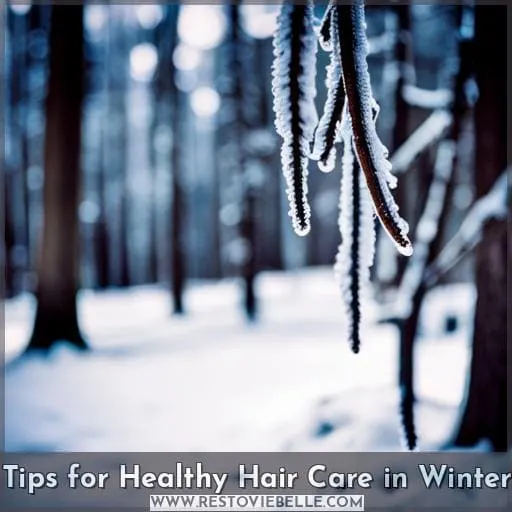This site is supported by our readers. We may earn a commission, at no cost to you, if you purchase through links.
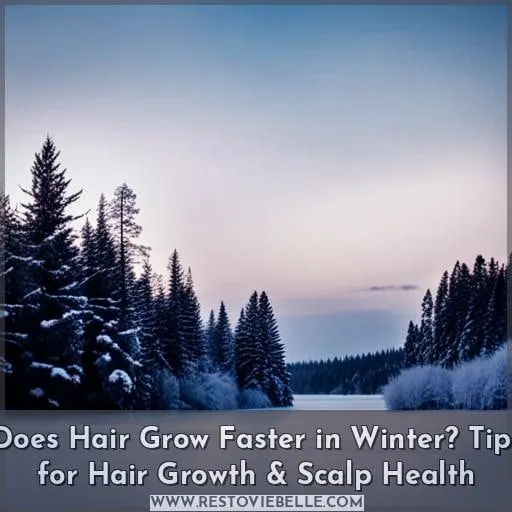
Discover why hair grows slower in winter, how to protect your strands from the harsh weather, and what nutrition habits can support optimal hair growth.
Table Of Contents
- Key Takeaways
- Why Does Hair Grow Slower in Winter?
- Tips for Promoting Hair Growth in Winter
- How to Protect Your Hair in Winter
- Common Myths About Winter Hair Growth
- When to Seek Professional Help for Hair Growth Issues
- The Role of Nutrition in Hair Growth
- How to Maintain Scalp Health in Winter
- Debunking Hair-Care Myths
- Tips for Healthy Hair Care in Winter
- Frequently Asked Questions (FAQs)
- Can wearing hats and scarves in winter affect hair growth?
- Is there a specific hairstyle that promotes faster hair growth in winter?
- Are there any specific vitamins or supplements that can help with hair growth in winter?
- Can scalp massages really stimulate hair growth during the winter?
- Are there any specific hair-care myths related to winter hair growth that should be debunked?
- Conclusion
Key Takeaways
- Hair growth speed does not change with seasons.
- Reduced blood circulation in colder temperatures may impact hair growth.
- Shorter daylight hours can lead to lower vitamin D levels, which may affect hair growth.
- Dryness due to indoor heating can cause damage and slow down hair growth.
Why Does Hair Grow Slower in Winter?
During winter, hair growth tends to slow down due to several factors.
One major factor is reduced blood circulation in colder temperatures, which can limit the delivery of essential nutrients to the hair follicles.
Additionally, winter clothing like hats and scarves can cause friction and lead to breakage and damage.
These effects combined contribute to slower hair growth during the winter months.
Seasonal Changes in Hair Growth
If you’re wondering why your hair seems to grow slower in winter, it’s due to seasonal changes that affect the rate of hair growth.
These changes include:
- Reduced blood circulation
- Shorter daylight hours leading to lower vitamin D levels
Effects of Cold Weather on Scalp and Hair
Cold weather can have a detrimental impact on the health of your scalp and hair, leading to slower hair growth during winter months.
The dryness and lack of sunlight can cause issues such as dandruff, dry scalp, hair loss, breakage,and damage.
Reduced Blood Circulation in Winter
When winter arrives, the reduced blood circulation in your scalp can contribute to slower hair growth. Cold weather restricts blood flow, limiting nutrient delivery to hair follicles and affecting their ability to grow.
- Cold weather restricts blood vessels: Reduced blood flow in cold temperatures hampers the delivery of essential nutrients and oxygen to the hair follicles.
- Lack of vitamin D: Limited sun exposure during winter leads to lower levels of vitamin D, which plays a crucial role in regulating keratin production for healthy hair growth.
- Winter hats and scarves: Wearing tight or rough-textured winter hats can cause friction on the scalp, leading to breakage and potential damage.
- Dryness due to indoor heating: Artificial heat sources indoors during wintertime often result in dry air that dehydrates both the skin and scalp.
- Impact of nutrition on circulation: A poor diet lacking necessary vitamins and minerals can further impair overall circulatory health.
Impact of Winter Clothing on Hair Health
Protect your hair from potential damage and breakage caused by winter clothing like hats and scarves.
Tight hairstyles can lead to hair breakage, while friction from hats and scarves can cause styling problems.
Dry air in cold weather may also result in scalp irritation and dry hair.
Tips for Promoting Hair Growth in Winter
To promote hair growth in winter, it’s important to focus on a few key tips.
First, maintain a balanced diet that includes essential nutrients for healthy hair growth.
Consider taking hair growth supplements or vitamins if your diet is lacking in these nutrients.
Lastly, pay attention to scalp health by using gentle products and practicing regular scalp massages to improve blood circulation.
By implementing these tips, you can support optimal hair growth even during the winter months.
Eat a Balanced Diet for Hair Health
To promote hair growth during the winter, how can you ensure that you’re eating a balanced diet for optimal hair health?
- Eat plenty of fruits and vegetables.
- Avoid harsh hair products.
- Get enough sleep.
- Manage stress levels.
- Exercise regularly.
Take Hair Growth Supplements or Vitamins
To promote hair growth during winter, enhance your efforts by taking hair growth supplements or vitamins.
These supplements can contain ingredients that support healthy hair growth and provide essential nutrients.
Ensure you follow the recommended dosage to avoid any potential side effects.
Maintain Scalp Health
To maintain scalp health and promote hair growth in winter, incorporate these tips into your routine:
- Avoid tight hairstyles
- Use scalp serums
- Take vitamins
- Opt for sulfate-free shampoo
- Sleep on silk pillowcases
Consider regular scalp massages to stimulate follicles and improve overall scalp health.
How to Protect Your Hair in Winter
To protect your hair in winter, there are several important steps you can take:
First, consider wearing a hat or scarf to shield your hair from the cold and harsh elements.
Secondly, avoid using excessive heat styling tools as they can lead to dryness and breakage.
Finally, be sure to moisturize your hair regularly with hydrating products and deep conditioning treatments to keep it healthy and strong throughout the season.
Avoid Excessive Heat Styling
To protect your hair in winter and promote healthy growth, avoid excessive heat styling.
Use heat protectant, air dry hair, use silk pillowcases, avoid tight hairstyles, and don’t brush wet hair.
Limit Hair Washing Frequency
To protect your hair in winter, limit the frequency of washing it to maintain its health and prevent excessive dryness.
- Wash hair less
- Dry naturally
- Avoid hot tools
- Use conditioner
- Incorporate scalp massages
Wear Protective Hairstyles
If you frequently expose your hair to harsh winter conditions, it’s important to wear protective hairstyles that minimize damage and promote healthy hair growth.
Avoid tight hairstyles, use gentle products, and wear hats for added protection.
Use Silk or Satin Pillowcases
Protect your hair in winter by using silk or satin pillowcases.
These smooth fabrics reduce friction, preventing damage and reducing hair breakage.
They also promote hair health and protect against parabens found in cotton pillowcases.
Common Myths About Winter Hair Growth
There are several common myths surrounding winter hair growth that need to be debunked.
Contrary to popular belief, hair doesn’t grow faster in the winter season.
Additionally, cold water rinses don’t stimulate hair growth, and trimming your hair doesn’t make it grow faster either.
It’s important to separate fact from fiction when it comes to maintaining healthy and growing hair during the winter months.
Hair Growth Speed Doesn’t Change With Seasons
Is it true that hair growth speed remains constant throughout the year, regardless of the season?
Contrary to popular belief, hair growth rate doesn’t change with seasons.
Hair Doesn’t Grow Faster in Winter
One common myth about winter hair growth is that it doesn’t grow faster during this season. However, there’s no scientific evidence to support this claim. Hair grows at a consistent rate regardless of the time of year.
Cold Water Rinses Don’t Stimulate Hair Growth
When it comes to promoting hair growth in winter, one common myth that needs debunking is that cold water rinses stimulate hair growth.
Cold water rinses don’t promote hair growth because they don’t have any direct effect on the scalp or the hair follicles.
Trimming Your Hair Doesn’t Make It Grow Faster
If you believe that trimming your hair will make it grow faster, you may be falling for a common myth about winter hair growth.
When to Seek Professional Help for Hair Growth Issues
If you’re experiencing:
- Persistent hair growth problems
- Sudden hair loss or thinning
- A family history of hair loss
- Underlying medical conditions that may be affecting your hair growth
It may be time to seek professional help. These signs could indicate an underlying issue that requires the expertise of a healthcare provider or dermatologist. They can assess your specific situation and recommend appropriate treatments or interventions to address your individual needs.
Persistent Hair Growth Problems
If you’re experiencing persistent hair growth problems, it’s important to seek professional help.
Factors such as genetics, age, diet, stress and health conditions can affect hair growth rate.
Sudden Hair Loss or Thinning
If you experience sudden hair loss or thinning, seek professional help.
Stress, telogen effluvium, anemia, thyroid problems, and vitamin deficiency can contribute to hair loss.
Family History of Hair Loss
Wondering when to seek professional help for hair growth issues due to a family history of hair loss?
Genetic factors play a role in hair loss, so consulting with a professional can provide valuable guidance and treatment options.
Underlying Medical Conditions
When experiencing persistent hair growth problems or sudden hair loss, it’s important to seek professional help for an accurate diagnosis and appropriate treatment.
- Anemia
- Thyroid problems
- Iron deficiency
- Stress
The Role of Nutrition in Hair Growth
When it comes to hair growth, nutrition plays a crucial role.
Essential nutrients such as vitamins C, B, and D, biotin, iron, and omega-3 fatty acids are essential for healthy hair growth.
Incorporating foods like salmon, eggs, avocados, sweet potatoes, berries, nuts, olive oil, fish, beans, and whole grains into your diet can promote hair health.
Additionally, supplements like biotin, fish oil, Nutrafol can support faster hair growth when combined with a balanced diet.
Essential Nutrients for Hair Health
To promote healthy hair growth, it’s important to ensure that you’re consuming essential nutrients through your diet.
| Nutrient | Role in Hair Health |
|---|---|
| Protein | Helps build keratin for strong and healthy hair |
| Iron | Necessary for oxygen transportation to the hair follicles |
| Zinc | Supports cell division and helps maintain scalp health |
| Biotin | Promotes hair growth by supporting keratin production |
| + Vitamin D + Essential for maintaining healthy follicle function |
Incorporating these nutrients into your diet can help nourish your hair from within and support optimal growth.
Foods That Promote Hair Growth
You can enhance hair growth by regularly incorporating foods that promote hair health into your diet.
Some examples include:
- Eggs for biotin
- Salmon for omega-3
- Avocados for vitamin E
- Nuts for protein
- Green tea for antioxidants
Supplements for Hair Growth
Take hair growth supplements or vitamins to support healthy hair growth during the winter.
Consider using:
- Biotin
- Fish oil
- Vitamins rich in iron and omega-3
Healthy Eating Habits for Hair Health
In the article ‘Does Hair Grow Faster in Winter? Tips for Hair Growth & Scalp Health’, let’s explore the importance of maintaining healthy eating habits to promote hair health.
| Nutrient | Role in Hair Growth |
|---|---|
| Protein | Promotes hair growth |
| Iron | Prevents hair loss |
| Omega-3 | Enhances hair health |
| Biotin | Increases hair thickness |
| Zinc | Reduces risk of hair loss |
Eating a balanced diet rich in protein, iron, omega-3 fatty acids, biotin, and zinc can support healthy and vibrant hair growth.
How to Maintain Scalp Health in Winter
To maintain scalp health during winter:
- Regular scalp massages can improve blood flow and deliver nutrients to the hair follicles for faster growth.
- Gentle exfoliation of the scalp helps remove dead skin cells and promote a healthier environment for hair growth.
- Moisturizing the scalp with hydrating products can prevent dryness and flakiness caused by cold weather.
- Protecting your scalp from harsh elements such as cold winds and extreme temperatures can help maintain its health during the winter months.
Regular Scalp Massages
To maintain scalp health in winter, incorporate regular scalp massages into your hair care routine. Scalp massages improve blood flow to the scalp, promoting hair growth and increasing hair thickness and density.
Gentle Scalp Exfoliation
To maintain scalp health in winter, incorporate gentle scalp exfoliation into your hair care routine.
- Remove dead skin cells and product buildup for a healthier scalp.
- Stimulate blood circulation to promote hair growth.
- Enhance the effectiveness of other hair care products.
- Use tools like a soft-bristle brush or a scrub with natural ingredients for gentle exfoliation.
Moisturizing the Scalp
Keep your scalp moisturized to maintain its health during the winter months.
Use scalp oils, serums, and massages to promote hair growth and prevent dryness.
Incorporate regular scalp exfoliation for optimal results.
Protecting the Scalp From Cold Weather
One way to protect your scalp from the cold weather and maintain its health during winter is by wearing a hat or beanie.
Other tips include:
- Using scarves to protect your hair.
- Avoiding tight hairstyles.
- Using a hair dryer on low heat.
Debunking Hair-Care Myths
Let’s debunk some common hair-care myths that may have influenced your winter hair growth beliefs.
Contrary to popular belief, frequent shampooing doesn’t stimulate hair growth; it only helps maintain scalp health.
Cold water rinses don’t close the hair cuticles either, as the temperature of water doesn’t affect their structure.
Lastly, brushing your hair 100 strokes a day won’t improve its growth rate but can help distribute natural oils for healthier-looking locks.
Frequent Shampooing Doesn’t Stimulate Hair Growth
When it comes to hair care myths, one common misconception is that frequent shampooing stimulates hair growth.
Shampooing doesn’t have a direct effect on the rate of hair growth.
Cold Water Rinses Don’t Close the Hair Cuticles
You can debunk the myth that cold water rinses close the hair cuticles by understanding how temperature affects the hair.
Cold water rinses don’t actually close the cuticles, but they do have other benefits for scalp health.
Brushing Your Hair 100 Strokes a Day Doesn’t Improve Hair Growth
Brushing your hair for 100 strokes a day doesn’t actually improve hair growth, contrary to popular belief.
Tips for Healthy Hair Care in Winter
To maintain healthy hair during winter, it’s important to:
- Limit the use of heat styling tools that can cause damage and dryness.
- Protect your hair from extreme temperatures, as cold weather can lead to brittle and frizzy hair.
By taking these precautions, you can ensure that your hair remains strong and vibrant throughout the winter season.
Limit the Use of Heat Styling Tools
To maintain healthy hair during the winter months, it’s important to limit your use of heat styling tools.
Heat can damage your hair and lead to dryness and breakage.
Instead, opt for air-drying or using cool settings on your styling tools.
Remember to use a heat protectant spray before applying any heat and deep condition regularly.
Trim split ends as they can cause further damage.
Protect Your Hair From Extreme Temperatures
To protect your hair from extreme temperatures during the winter months, it’s important to take preventive measures.
- Wear a hat outdoors.
- Avoid hot water when washing your hair.
- Use a leave-in conditioner for added moisture and protection.
- Avoid tight hairstyles that can cause breakage.
- Use a heat protectant before using any styling tools.
Hydrate Your Hair From the Inside Out
To hydrate your hair from the inside out during winter, focus on nourishing it with essential nutrients and maintaining a healthy diet.
- Drink plenty of water.
- Avoid harsh chemicals.
- Use a leave-in conditioner.
- Wear a shower cap.
- Sleep on a silk pillowcase.
Frequently Asked Questions (FAQs)
Can wearing hats and scarves in winter affect hair growth?
Wearing hats and scarves in winter can potentially affect hair growth due to friction and breakage caused by these accessories.
It’s recommended to opt for loose-fitting headwear or protect the hair with a silk lining to minimize damage.
Is there a specific hairstyle that promotes faster hair growth in winter?
Looking for a specific hairstyle to promote faster hair growth in winter? While there’s no scientific evidence supporting a particular style, maintaining loose hairstyles and avoiding tight ponytails can reduce pressure on the hair follicles, potentially aiding in healthier and faster hair growth.
Are there any specific vitamins or supplements that can help with hair growth in winter?
To promote hair growth in winter, consider taking vitamins and supplements known to support hair health.
Biotin, vitamin C, omega-3 fatty acids, and iron are key nutrients that can aid in faster hair growth.
Consult with a healthcare professional for personalized advice.
Can scalp massages really stimulate hair growth during the winter?
Yes, scalp massages can stimulate hair growth during the winter.
By improving blood flow to the scalp and delivering essential nutrients, they activate dormant hair follicles and promote faster hair growth.
Try incorporating scalp massages into your winter hair care routine for optimal results.
Are there any specific hair-care myths related to winter hair growth that should be debunked?
Debunking winter hair growth myths:
Contrary to popular belief, there’s no scientific evidence that hair grows faster in the winter. Factors like genetics and overall health have a greater impact on hair growth than seasonal changes.
Conclusion
To debunk the myth, hair doesn’t grow faster in winter. In fact, the cold weather and seasonal changes can actually slow down hair growth.
However, there are ways to promote healthy hair growth and scalp health during this time. By maintaining a balanced diet, taking hair growth supplements or vitamins, and practicing good scalp care, you can support optimal hair growth even in the chilly months.

